Day 10The TransAlp felt great after the service. Aparantly half of Lichtenburg's sand came out of the air filter.

Andre was out of the tournament so there was no reason to stick around in Bloem anymore. Pity I missed out on meeting the Bloem Wild Dogs though.

I was looking at the maps. The world is my oyster!

I've just come from the West and North would take me too far (I had an open ended itinerary but wanted to be back in George in about three days). Lesotho caught my eye, but I didn't have my passport

A ride around Lesotho maybe?

I really wanted to do this trip but decided against it. If I'm going to ride through Natal I want to do it properly, not rush through.
South was the only option left. But first - the Womans' Monument.
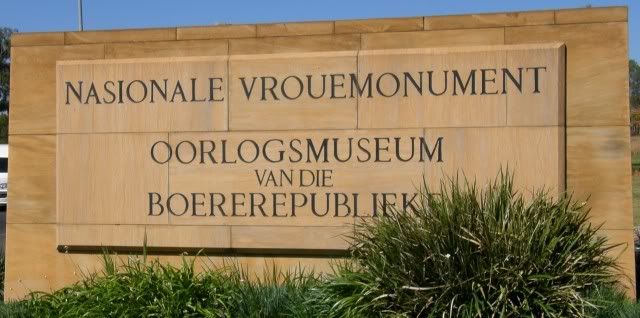
The National Women's Memorial, a sandstone shrine impressive in its simplicity, is a celebrated example of South African sculpture art created by Anton von Wouw.
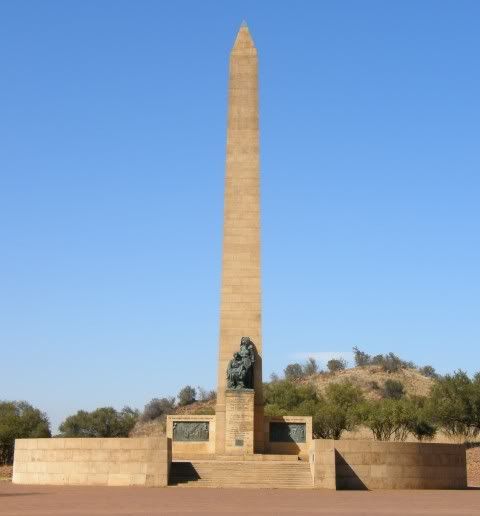
The discovery of gold at Witwatersrand in the Transvaal in 1886 ended Boer seclusion, and brought a mortal threat to the young nation's dream of freedom from alien rule. As often happens in history, important aspects of the Anglo-Boer conflict came to light only years after the fighting had ended. In a masterful 1979 study, The Boer War, British historian Thomas Pakenham revealed previously unknown details about the conspiracy of British colonial officials and Jewish financiers to plunge South Africa into war.
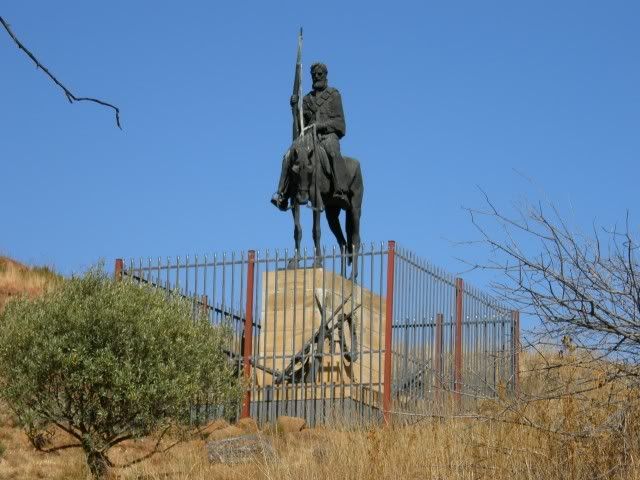
Boer men were citizen-soldiers. By law, all males in the two republics between the ages of 16 and 60 were eligible for war service. Even as they prepared to face the might of the world's foremost imperial power, the Boers were confident and determined. Although outnumbered, their morale was good. They were fighting for their land, their freedom and their way of life - and on familiar home territory. Boers fighters were also chivalrous in combat. A few years after the end of the war, when passions had cooled somewhat, the London Times' history of the war conceded:
In the moment of their triumph the Boers behaved with the same unaffected kindheartedness ... which they displayed after most of their victories. Although exultant they were not insulting. They fetched water and blankets for the wounded and treated prisoners with every consideration.
In stark contrast to this
Lord Kitchener ordered all Boer prisoners to be killed. In addition to this civilians were to be targeted, their possessions burnt and the women and girls rounded up in camps.
John Dillon, an Irish nationalist Member of Parliament, spoke out against the British policy of shooting Boer prisoners of war. On February 26, 1901, he made public a letter by a British officer in the field:
The orders in this district from Lord Kitchener are to burn and destroy all provisions, forage, etc., and seize cattle, horses, and stock of all sorts wherever found, and to leave no food in the houses of the inhabitants. And the word has been passed round privately that no prisoners are to be taken. That is, all the men found fighting are to be shot. This order was given to me personally by a general, one of the highest in rank in South Africa. So there is no mistake about it. The instructions given to the columns closing round De Wet north of the Orange River are that all men are to be shot so that no tales may be told. Also, the troops are told to loot freely from every house, whether the men belonging to the house are fighting or not.
Dillon read from another letter by a soldier that had been published in the Liverpool Courier:
"Lord Kitchener has issued orders that no man has to bring in any Boer prisoners. We take no prisoners now ... There happened to be a few wounded Boers left. We put them through the mill. Every one was killed."
Monument to the men who had to leave their wifes and children to go of to war:
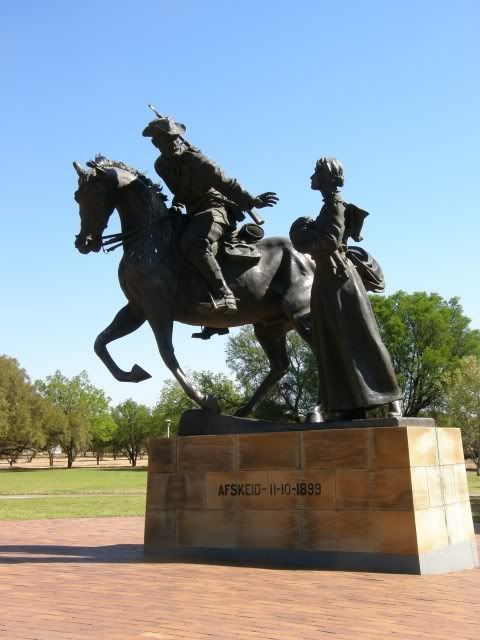
Altogether the British held 116,572 Boers in their South African internment camps -- that is, about a fourth of the entire Boer population -- nearly all of them women and girls.
The boys and old men were sent off to prison camps in India, Bermuda and St. Helena amongst others. Thousands of them died en route and even more died in the prison camps.
There are several plaques with the names of the deceased.
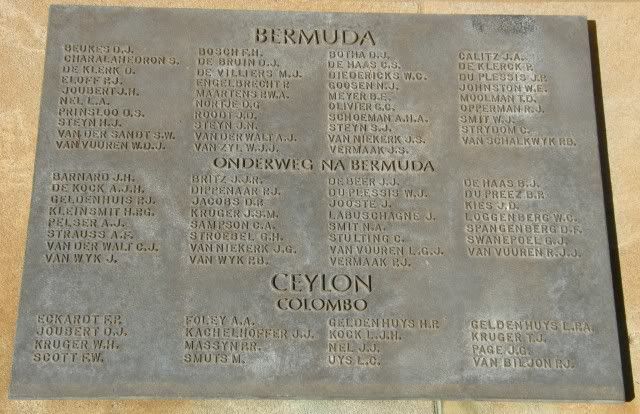
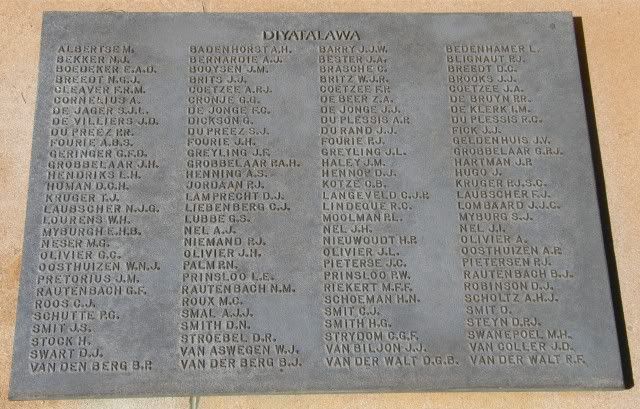
The women and girls held by the British soldiers had it even worse.
A crusading 41-year-old English spinster,
Emily Hobhouse, visited the South Africa camps and, armed with this first-hand knowledge, alerted the world to their horrors. She told of internees "
... deprived of clothes ... the semi-starvation in the camps ... the fever-stricken children lying... upon the bare earth ... the appalling mortality. These people will never ever forget what has happened," She also declared. "
The children have been the hardest hit. They wither in the terrible heat and as a result of insufficient and improper nourishment ... To maintain this kind of camp means nothing less than murdering children."
"These people will never ever forget what has happened" - I will come back to this interesting statement.
Each concentration camp has it's own plaque:
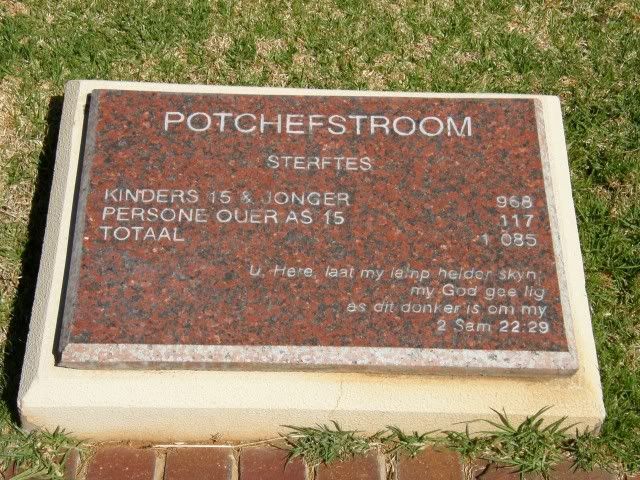
117 Women and 968 girls of fifteen years or younger died in this particular camp.
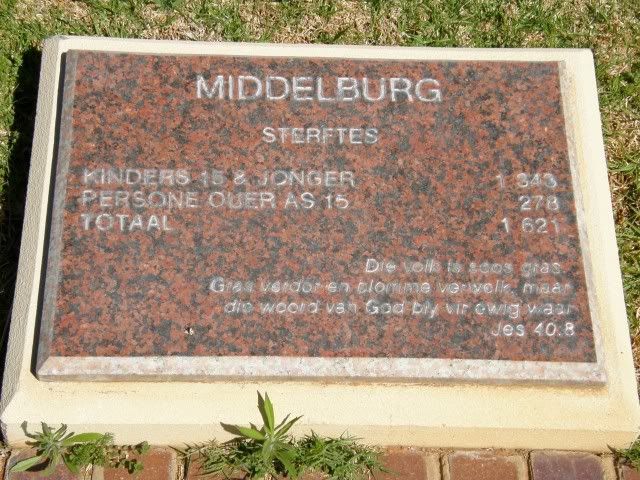
These individual plaques line the pathway to the monument - both sides...
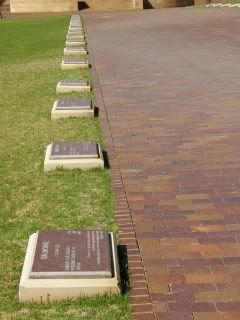
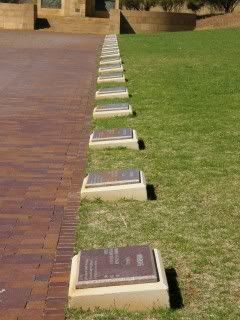
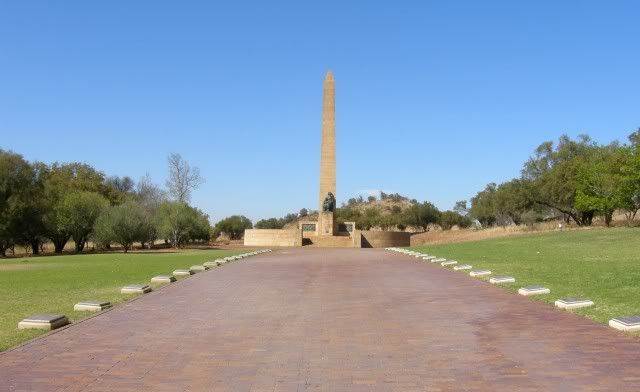
In a report to members of Parliament, Hobhouse described conditions in one camp she had visited:
... A six month old baby [is] gasping its life out on its mother's knee. Next [tent]: a child recovering from measles sent back from hospital before it could walk, stretched on the ground white and wan. Next a girl of 21 lay dying on a stretcher. The father ... kneeling beside her, while his wife was watching a child of six also dying and one of about five drooping. Already this couple had lost three children.
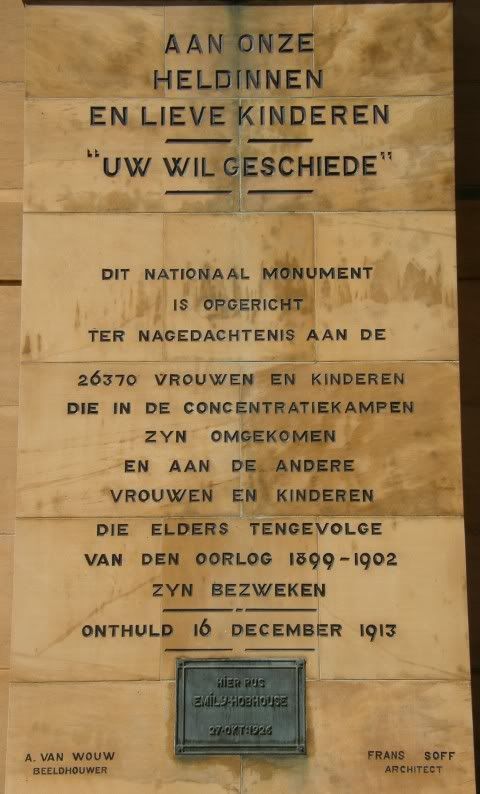
Hobhouse found that none of their hardships would shake the Boer women's determination, not even seeing their own hungry children die before their eyes. They "never express," she wrote, "a wish that their men must give way. It must be fought out now, they think, to the bitter end."
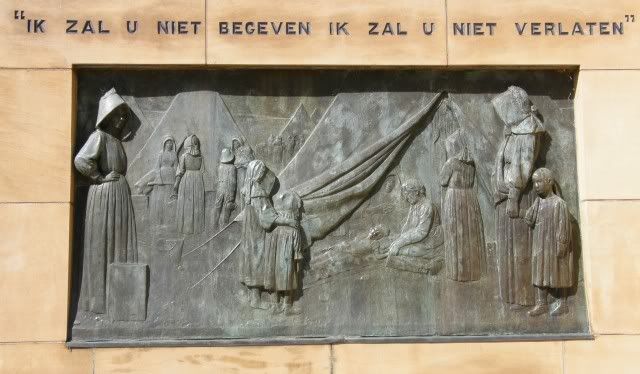
From Wikipedia:
Concentration CampsThe term concentration camp was first used by the British military during the Boer War (1899-1902). Facing attack by Boer guerrillas, British forces rounded up the Boer women and children as well as black people living on Boer land, and sent them to 34 tented camps scattered around South Africa. This was done as part of a scorched earth policy to deny the boer guerrillas access to the supplies of food and clothing they needed to continue the war.
Though they were not extermination camps, the women and children of Boer men who were still fighting were given smaller rations than others. The poor diet and inadequate hygiene led to endemic contagious diseases such as measles, typhoid and dysentery. Coupled with a shortage of medical facilities, this led to large numbers of deaths — a report after the war concluded that 27,927 Boer (
of whom 22,074 were children under 16) and 14,154 black Africans had died of starvation, disease and exposure in the camps. In all, about 25% of the Boer inmates and 12% of the black African ones died.
In contrast to these figures, only around 3,000 Boer men were killed (in combat) during the Boer War.
A delegate of the South African Women and Children's Distress Fund, Emily Hobhouse, did much to publicise the distress of the inmates on her return to Britain after visiting some of the camps in the Orange Free State. Her fifteen-page report caused uproar, and led to a government commission, the Fawcett Commission, visiting camps from August to December 1901 which confirmed her report.
After meeting with Hobhouse, Sir Henry Campbell-Bannerman, leader of the Liberal Party opposition (and future Prime Minister), publicly declared: "When is a war not a war? When it is waged by methods of barbarism in South Africa." This memorable phrase -- "methods of barbarism" -- quickly became widely quoted, provoking both warm praise and angry condemnation.
On the Boer side 90% of the people that died were non-combatants - women, children and the elderly. The British officers and soldiers received lordships, titles and medals for honour and bravery.

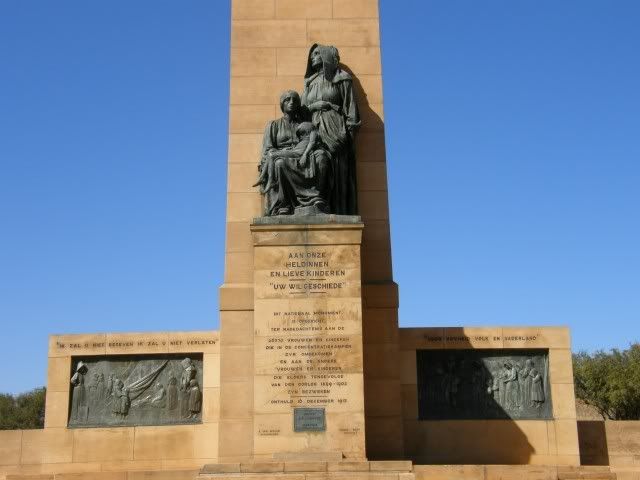
After the war ended several books were written (most in Dutch) detailing the battles as well as the war crimes of the British, including accounts of the rapes and gang rapes that was an almost daily occurrence in the concentration camps. These books were banned by the British. The Union of South Africa came into being on 31 May 1910, with the previously separate colonies of the Cape, Natal, Transvaal and the Orange Free State becoming Provinces in the Union of South Africa.
It was founded as a dominion, later Commonwealth realm, but became a republic on 31 May 1961. Even after independence from Brittan these books were not unbanned. It was thought that they would fuel and entrench the hatred against the British and hamper national unity. Few of these records still exist today. The ban is still in place as far as I know.
Today, more than a century later, the atrocities are still not forgotten. Emily Hobhouse was right.
Time to hit the road.
I stopped for fuel and saw these two classics:
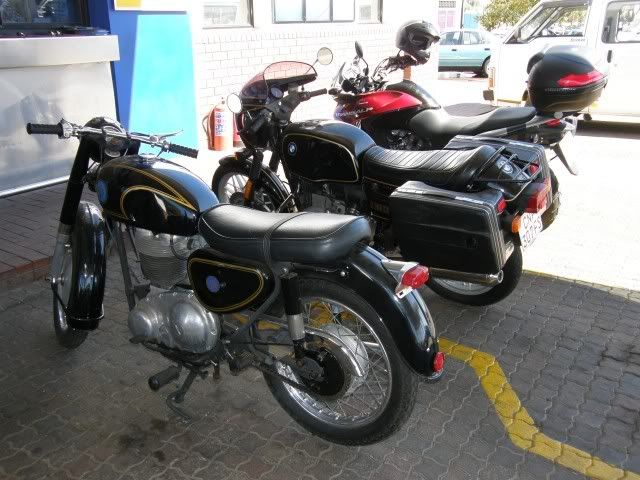
Come to think of it, it almost looks like an evolution photo

I headed South for the hills of the Eastern Cape. I needed some variety in scenery.
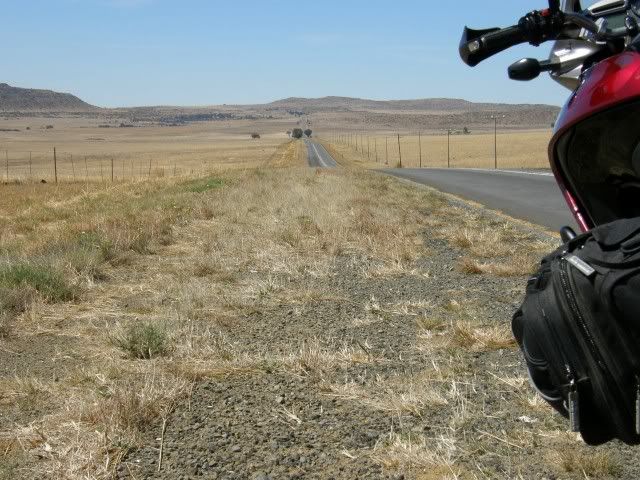
The Southern Freestate also has some hills...
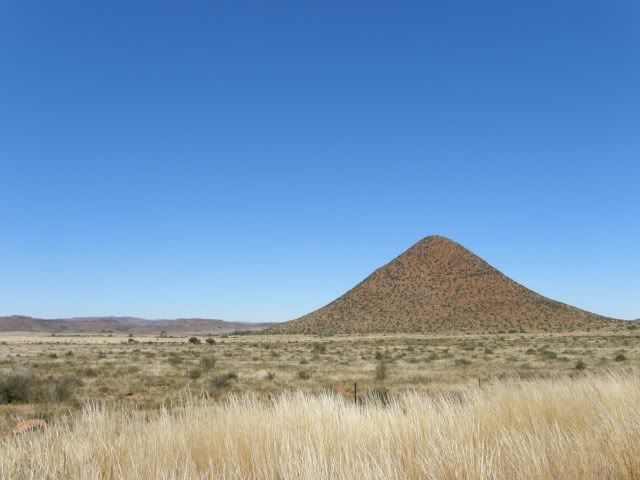
...but I'd hate to meet the mole that made this one!


I rode South through Reddersburg but when I got to Smithfield I had a look at the map again. The Gariep Dam to the West seems interesting... And there is a road that runs all along the dam. So off I went. Next town Bethulie.
It lies next to the back end of the Dam, just inside the Freestate border.
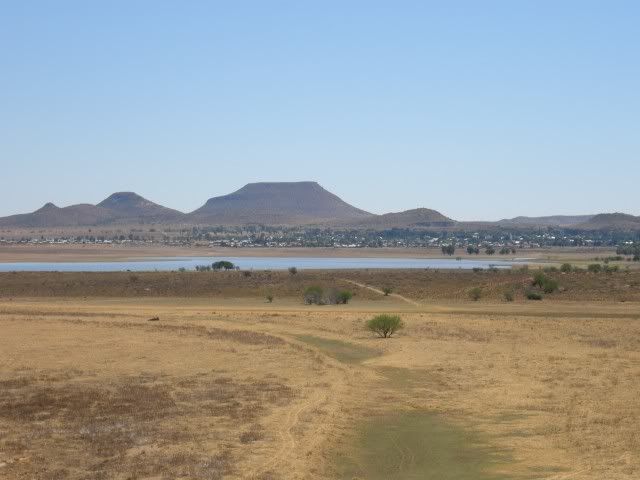
The bridge going over into the Eastern Cape carries normal traffic as well as trains.
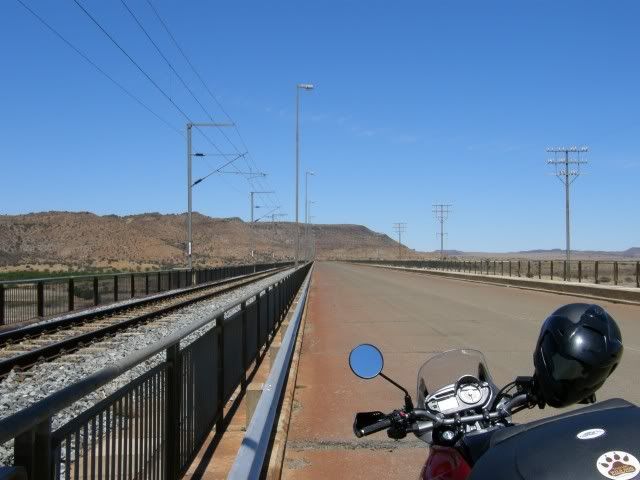
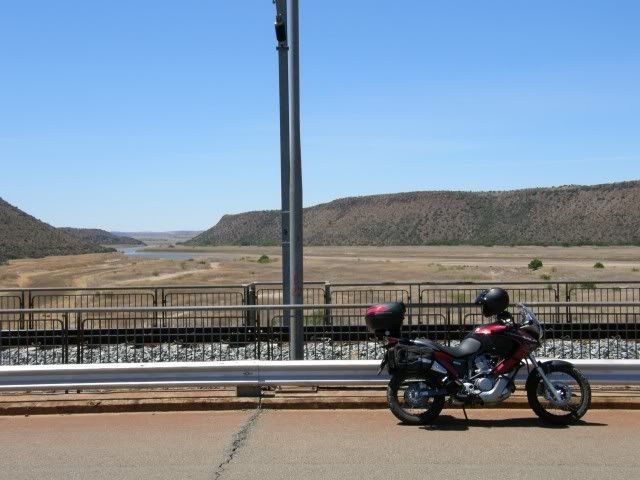
Well well, the road I saw on the map turns out to be a route

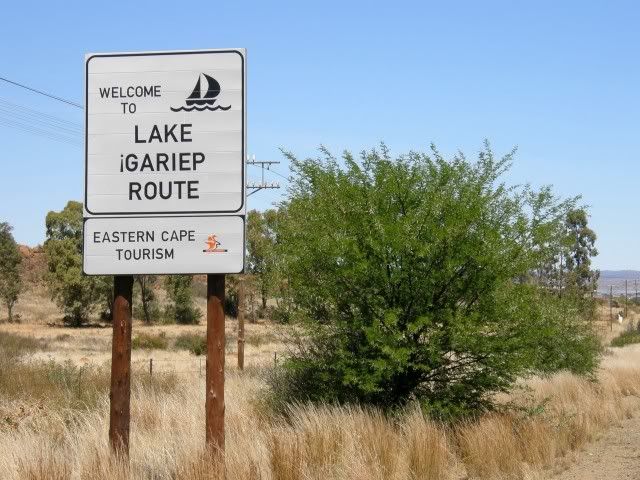
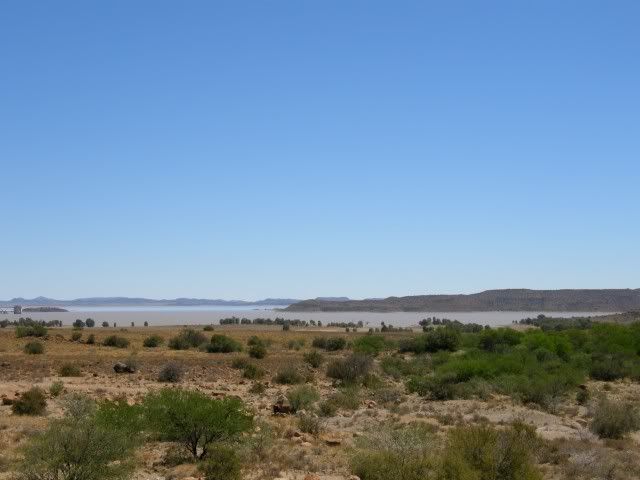
I like solo trips and love the Karoo, but somehow this just didn't feel right.
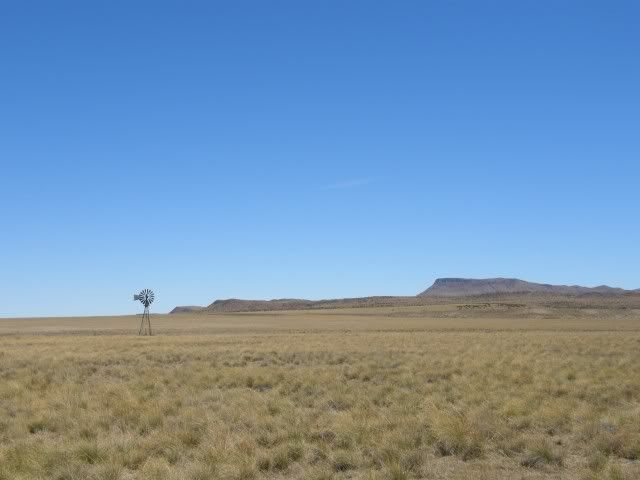
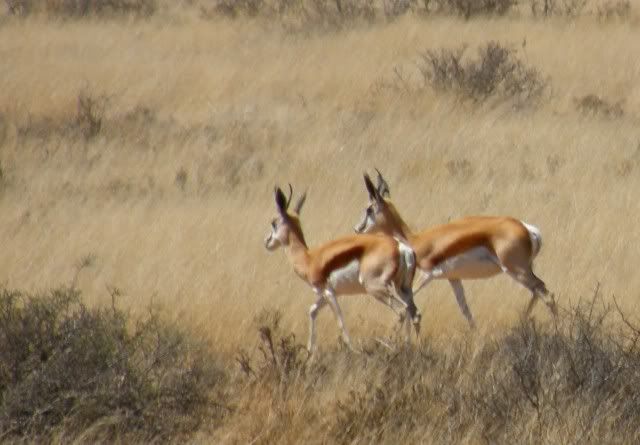
I rode past Venterstad and Steynsburg (I only realized later how close I was to the Stormberg Battlefield

) with plans to reach Nieu-Betesda or Graaf Reinet for the night.
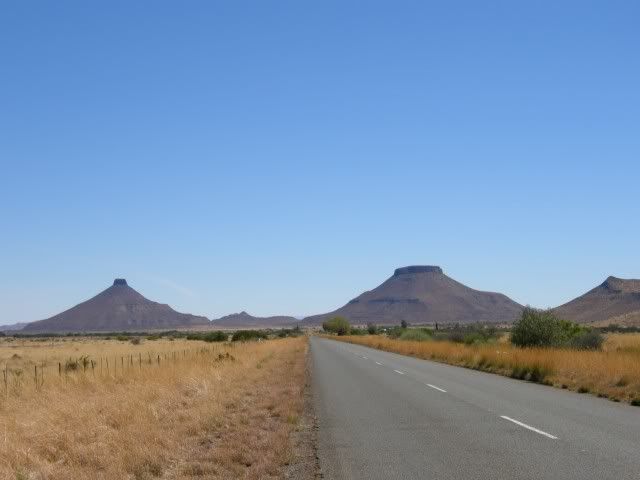
It was just after midday (and the heat was unbearable) when I rode into Middelburg. I refeuled and then I saw this!
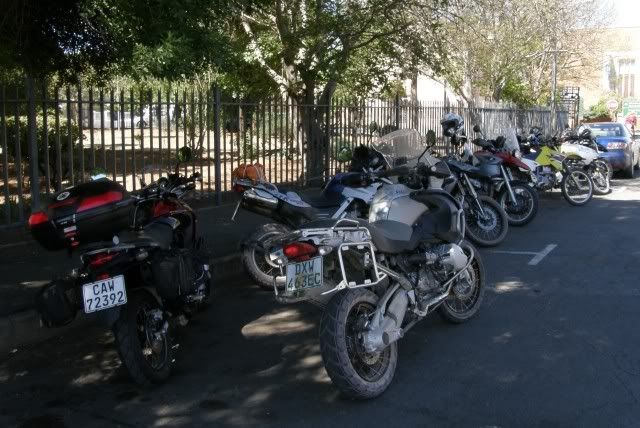
BMW's (650, 800, 1200) as well as a V-strom 650 and a DRZ400. These just had to be Eastern Cape Wild Dogs

I walked into the Saddles where they were at and ordered a beer. Turns out they were not Wild Dogs. Never even heard of it

Just a bunch of friends on an out-ride and on their way back to PE just as I sat down. Nice blokes though.
After lunch and another beer the rugby started. When I ordered my third beer I knew I was staying. I booked into the Karoo Country Inn for the night.
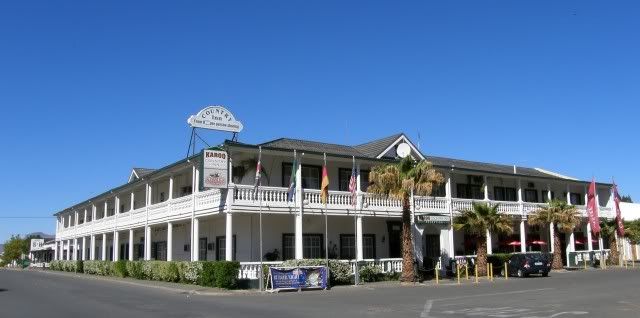
It was nice mingling with the locals and getting a feeling for the town. The one guy I watched the rugby with turned out to be an estate agent from Noupoort. Of course he had an investment opportunity I just "couldn't afford to miss"

Don't you just hate pushy salesmen? The second game I watched in the safety of my air conditioned hotel room while I worked on the ride report.
I did just over 400km for the day.

